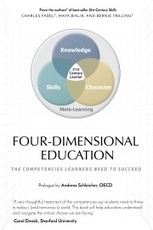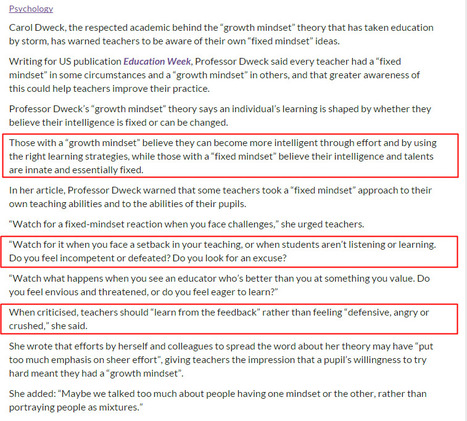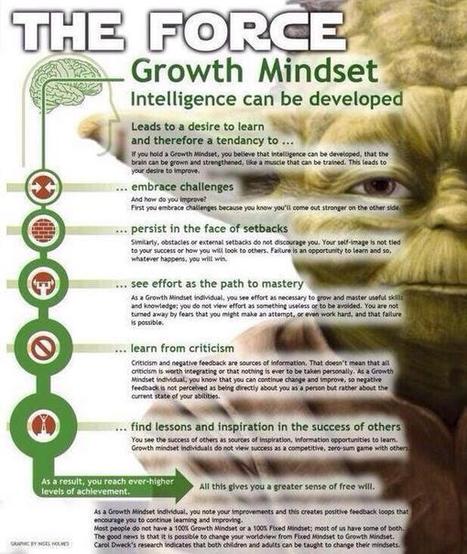Read an excerpt... Four-Dimensional Education: The Competencies Learners Need to Succeed October 2015 192 pages Copyright © 2015 by Center for Curriculum Redesign All rights reserved. ISBN-13: 978-1518642562 ISBN-10: 151864256X "A very thoughtful treatment of the competencies our students need to thrive in today’s (and tomorrow’s) world. This book will help educators understand and navigate the critical choices we are facing.” –Carol Dweck, Lewis & Virginia Eaton Professor of Psychology, Department of Psychology, Stanford University
Get Started for FREE
Sign up with Facebook Sign up with X
I don't have a Facebook or a X account
 Your new post is loading... Your new post is loading...
 Your new post is loading... Your new post is loading...

Rosemary Tyrrell, Ed.D.'s curator insight,
November 25, 2015 11:55 AM
Effort without results is hardly better for learning than results without effort. 
Pamela D Lloyd's curator insight,
November 27, 2015 6:57 PM
It's important that praise be aligned with relevant and useful feedback. All learners need to know what they are doing right, and what they are getting wrong, in order to progress. 
Dixie Binford's curator insight,
November 30, 2015 10:16 AM
Implementation with fidelity is important when new strategies from research comes to the classroom. We often "cherry-pick" what we feel comfortable with but it is necessary to "lean in" and implement as intended by the author or researcher. Be committed to self-reflection and evaluation of the progress you see in students. Adjust, refine and commit to improving your execution.
Wynne Boliek's curator insight,
November 23, 2015 1:41 PM
It is a myth that we operate under a set of oppressive bureaucratic constraints. In reality, teachers have a great deal of autonomy in the work they chose to do in their classrooms. In most cases it is our culture that provides the constraints. For individual teachers, trying out new practices and pedagogy is risky business and both our culture, and our reliance on hierarchy, provide the ideal barriers for change not to occur. As Pogo pointed out long ago, “we have met the enemy and it is us.” http://www.cea-ace.ca/blog/brian-harrison/2013/09/5/stop-asking-permission-change
Learn more:
http://www.scoop.it/t/21st-century-learning-and-teaching/?tag=Growth+Mindset

Blanca Fondevila's curator insight,
January 31, 2016 10:11 AM
A serious problem that must be solve..

María Dolores Díaz Noguera's curator insight,
February 5, 2016 4:12 AM
Teacher Agency: Educators Moving from a Fixed to a Growth Mindset | @scoopit via @knolinfos http://sco.lt/...

Rosemary Tyrrell, Ed.D.'s curator insight,
September 27, 2015 4:15 PM
Using growth mindset to improve our own teaching practice? Sounds like a plan. 
Sylvianne Parent's curator insight,
September 6, 2015 1:09 PM
Lorsque les élèves éprouvent de grandes difficultés à l'école, il est primordial de leur enseigner à développer un esprit de croissance personnelle axé sur les efforts et les défis personnels. Le concept de growth mindset est vraiment intéressant pour illustrer aux enfants que l'intelligence et le succès n'est pas fixe mais relié aux efforts aux tentatives et aux réajustements. Voir Carole DWECK l'auteure de ce concept. |

Silvia Meza's curator insight,
October 3, 2015 9:32 AM
En ocasiones como educadores olvidamos el peso de nuestras acciones,actitudes en nuestros alumnos nos envuelve la inercia de la máquina burocrática.Nos invade la sensación de impotencia de ser una voz que grita en el desierto,sin embargo podemos ser agentes de cambio.Primero creyendo en nosotros mismos, como profesionales de la educación que podemos influir en ellos. Luego transmitiendo esa mentalidad a nuestros educandos,creyendo en sus capacidades,su potencial. Deleuze en la teoría del etiquetado señalaba como un juicio negativo acerca del alumno,se convierte en algo que lo define como persona. Entonces cuando me comunico con mi clase siempre rescatar lo positivo,señalar que se puede mejorar,no esgrimir juicios perentorios.

Molly Quinn's curator insight,
August 5, 2015 11:40 AM
Most educators would be aware of the term ‘growth mindset’ by now. The idea is you can work on being smarter. Whatever abilities and talents you have are just a starting point, if you work hard, make mistakes and keep trying, you can achieve. Teachers are using it to encourage and motivate children in their classrooms.
Learn more:
http://www.scoop.it/t/21st-century-learning-and-teaching/?tag=Growth+Mindset

Andres Garcia Alvarez's curator insight,
August 5, 2015 6:13 PM
Most educators would be aware of the term ‘growth mindset’ by now. The idea is you can work on being smarter. Whatever abilities and talents you have are just a starting point, if you work hard, make mistakes and keep trying, you can achieve. Teachers are using it to encourage and motivate children in their classrooms.
Learn more:
http://www.scoop.it/t/21st-century-learning-and-teaching/?tag=Growth+Mindset

Ellen Dougherty's curator insight,
August 8, 2015 8:47 PM
Most educators would be aware of the term ‘growth mindset’ by now. The idea is you can work on being smarter. Whatever abilities and talents you have are just a starting point, if you work hard, make mistakes and keep trying, you can achieve. Teachers are using it to encourage and motivate children in their classrooms.
Learn more:
http://www.scoop.it/t/21st-century-learning-and-teaching/?tag=Growth+Mindset

Julie Jensen's curator insight,
August 4, 2015 5:06 PM
How educators can assist learners is developing a growth mindset.
Learn more:
- http://www.scoop.it/t/21st-century-learning-and-teaching/?tag=Growth+Mindset
- http://www.scoop.it/t/21st-century-learning-and-teaching/?tag=Criticism

kathy pryor's curator insight,
August 6, 2015 8:22 PM
How educators can assist learners is developing a growth mindset.
Learn more:
- http://www.scoop.it/t/21st-century-learning-and-teaching/?tag=Growth+Mindset
- http://www.scoop.it/t/21st-century-learning-and-teaching/?tag=Criticism

Molly Quinn's curator insight,
August 7, 2015 11:50 AM
How educators can assist learners is developing a growth mindset.
Learn more:
- http://www.scoop.it/t/21st-century-learning-and-teaching/?tag=Growth+Mindset
- http://www.scoop.it/t/21st-century-learning-and-teaching/?tag=Criticism
|

























Read an excerpt... Four-Dimensional Education: The Competencies Learners Need to Succeed October 2015 192 pages Copyright © 2015 by Center for Curriculum Redesign All rights reserved. ISBN-13: 978-1518642562 ISBN-10: 151864256X "A very thoughtful treatment of the competencies our students need to thrive in today’s (and tomorrow’s) world. This book will help educators understand and navigate the critical choices we are facing.” –Carol Dweck, Lewis & Virginia Eaton Professor of Psychology, Department of Psychology, Stanford University